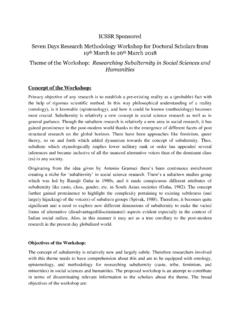Transcription of The Sociology of Youth Subcultures
1 Peace Review 16:4, December (2004), 409-4J 4 The Sociology of Youth SubculturesAlan O'ConnorThe main theme in the Sociology of Youth Subcultures is the reladon betweensocial class and everyday experience. There are many ways of thinking aboutsocial class. In the work of the French sociologist Pierre Bourdieu the mainfactors involved are parents' occupation and level of education. These havesignilicant effects on the life chances of their children. Social class is not a socialgroup: the idea is not that working class kids or middle class kids only hang outtogether.
2 There may be some of this in any school or town. Social class is astructure. It is shown to exist by sociological research and many people may onlybe partly aware of these structures or may lack the vocabulary to talk aboutthem. It is often the case that people blame themselves their bad school gradesor dead-end job for what are, at least in part, the effects of a system of socialclass that has had significant effects on their lives. The main point of Bourdieu'sresearch is to show that many kids never had a fair chance from the spite of talk about "globalizadon" there are significant differences betweendifferent sociedes.
3 Social class works differently in France, Mexico and For example, the educadon system is different in each country. In studyingissues of Youth culture, it is important to take these differences into account. Thesystem of social class in each country is always experienced in complex include differences between living in the city, a provincial town or thecountry. In many societies including the United States social class is lived outas differences in ethnicity. In most societies there are also significant genderdifferences. We wdll expect to find the effects of these differences in American Sociology in the 1950s a very conservadve time in academicresearch research on Youth gangs and deviance indirectly showed the effects ofclass.
4 It was argued that Youth who cannot achieve according to social norms,who cannot do well in school or find good jobs, create Subcultures . These in turnhave their own roles and norms which these Youth can fulfill. The idea was thatyouth who do badly at school create their own litde societies in which they canachieve status by smoking, being tough or engaging in petty crime. This actuallyextends beyond Youth . Black men who were in effect excluded from good jobsin straight society could perhaps achieve success in their own terms through a"deviant" career as a jazz research on Subcultures in the 1970s had as its goal to argue againstISSN 1040-2659 print; ISSN 1469-9982 online/04/040409-06 2004 Taylor & Francis LtdDOI: Alan O'Connorthe idea that Youth Subcultures are simply generational conflict.
5 It is not only amatter of Youth briefly rebelling against their parents before settling down in asteady job. Research in cultural studies reintrodueed the theme of soeial are ways in which kids live out and understand a complex socialstructure. But this researeh method attempts to link eaeh subculture to a socialclass. Skinheads in the 1970s represent a "magical" recovery of traditionalworking class culture. At the same time, hippies are living out a rebellious middleclass eulture. There is some evidence for this, but this attempt to find a homologybetween subculture and its parent social class is too simple.
6 The practice is oftenmore is often said that punk subculture in England in the mid-1970s was aworking class subculture. It was "dole queue rock" performed by unemployedyouth. It represented the culture of high-rise working class ghettos. Certainly thisis the way that many punk musieians represented themselves and it is still thegeneral image of punk in England: that it was working elass. Some simplecalculations by Dave Laing in one of the best books on 1970s punk {One ChordWonders) show that the reality was more complex. He compares the biographiesof beat musicians (1963-1967) with the new generation of punk bands (1976-1978) according to whether they are working class (52 percent and 57 percent,respectively) or middle elass (48 percent and 43 pereent), and also whatpercentage are ex-students (22 percent and 29 percent).}
7 What the numbers showis that there is only a slight difference of social class between the sample of 1960smusicians and the punk bands of the 1970s. The figures also show that therewere many students involved in punk. Many of these were in art school, whichin England at the dme was a possibility for Youth who were not able to enteruniversity. There has been quite an amount of commentary on the influence ofart school on punk in England in the 1970s. It explains some of the self-consciousbehavior that was intended to shock, the emphasis on individual self-expressionand the extravagant dressing up.
8 Some of this was quite central concept of Bourdieu's Sociology of eulture is the idea of an artisticfield. He imagines this as a relatively autonomous space in soeiety whereartists compete for recognition of their work. Think of it from the point of viewof a person who wants to publish a novel, sell his or her artwork or be in a from your family baekground, you have a certain education (let'simagine you finished high school) and then have to make certain choices. Do yougo to art school? Take guitar lessons? These are individual choices we have allagonized over such deeisions but it is still you coming from a certain back-ground, taking the decision with those resources, with that social support or lackof it.
9 Bourdieu has a complex term for this: he ealls it the "habitus." It is acertain structure of experience, of ways of relating to the world. Some people willbelieve that university is impossible. Others will try for technical college. Otherswill risk everything perhaps against their parents' wishes on joining a with different kinds of cultural capital enter into an artistic field. Theybring resources from their habitus. They make all kinds of decisions. Should Ibuy a really good drum kit? Give up my day job and risk everything on theSociology of Youth Subcultures 41 1band?
10 Get married and have a kid? And the habitus is different according tosoeial class. Of course individual effort and risk-taking matters. But this is doneagainst the background of a habitus of which the most important factors arcparents' occupation and education, and lived out in complex ways in race,ethnicity, gender, city/country, region, etc. It makes a difference if you eanealculate that your parents will cover a month's rent in an emergency. It makesa difference if your parents will loan you $2,000 to start a record label,perhaps even encourage this.















